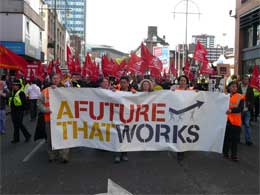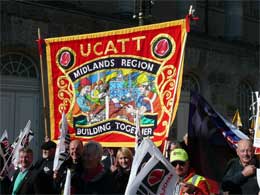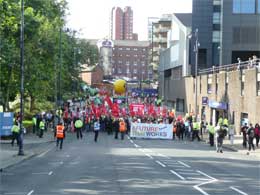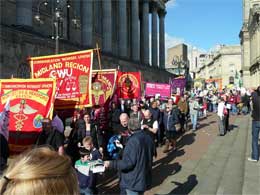A crisp and sunny autumn day
greeted around 2,500 trade unionists as they marched around the back streets
leading onto Broad Street where the Tory Party were at their annual shindig at
the ICC announcing yet more cuts to hit the poor and vulnerable in society.
A crisp and sunny autumn day
greeted around 2,500 trade unionists as they marched around the back streets
leading onto Broad Street where the Tory Party were at their annual shindig at
the ICC announcing yet more cuts to hit the poor and vulnerable in society.
The conference itself was
inaccessible, surrounded by 9-foot high steel sheeting and hundreds of police,
so we were allowed to briefly step onto Broad Street itself before being
ushered down Gas Street to make our way under canals and flyovers back to
Victoria Square in front of the Council House which we had left just over an
hour earlier.
Many trade unions had sent
delegations – Unite, PCS, Unison, GMB, BFAWU, NUT, UCU, FBU, UCATT and the
Musicians Union – and their banners and balloons billowed in the slight breeze.
There was even a Labour Party banner from Birmingham. The marchers were in
jovial spirits but determined to let their voices be heard. And at the rally at
the end of the march the voices of trade union elected leaders were heard.
All of the speakers
passionately denounced the attacks on working class living standards while the
bosses and the bankers pocketed vast sums in pay and bonuses. It was certainly
true that we, that is working class people, were all in this together in
suffering this assault on the meagre reforms that we had won through decades of
struggle. And this is only the beginning. Far more cuts are on their way and
this period of austerity – that is for the working class – is predicted to last
for at least another decade.
 Each speaker promised more
Each speaker promised more
strikes, marches and demonstrations and issued an appeal to all there to heed
the call of the TUC and get down to London on October 20th to fill
the capital with voices that oppose the plans of the government.
 But there was also a
But there was also a
realisation among some of the speakers, especially Matt Wrack of the FBU, that
we need more than strikes and marches. We also need a political programme so
that we have something to fight for and not just be against austerity. And the
beginnings of that programme was the call for the nationalisation of the banks
and finance houses under democratic control, a demand that had been passed in
Motion 27 at the TUC conference early in September, a motion moved by Matt
Wrack of the FBU.
The Labour Party also came in
for some stick. Speakers condemned statements by Ed Balls and Ed Miliband that
the wage freeze for public sector workers would continue when Labour wins the
next election. They demanded that the LP goes back to its roots and defends the
interests of the class in society whose industrial organisations, the trade
unions, created the LP.
Our next stop will be London
on October 20th. Up and down the country plans are well in motion to
ensure a massive turnout on the day with trains and coaches descending on the
capital. We will march in our tens of thousands to voice our opposition to the
government’s attacks on our living standards. But we will also demand that
Labour fights for a programme to defend its core supporters, the working class.
 We
We
will demand a programme to put an end to the misery of capitalism, beginning
with the nationalisation of the banks. The banner headline on the October
Socialist Appeal – Nationalise The Banks – expresses the essence of a real
alternative to the crisis of capitalism. That would be the beginnings of a real
future that works.






